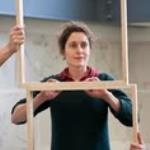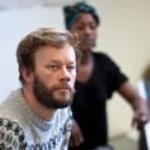Interview With Jane Eyre's Felix Hayes and Madeleine Worrall
An interview with ”Jane Eyre”’s leading couple Felix Hayes and Madeleine Worrall .

Jane Eyre opens at Bristol Old Vic in two parts from 20 February (previews from 11 Feb) with a run through to 26 March, directed by Sally Cookson. Madeleine Worrall (Jane) previous credits include Peter Pan, The Lady from The Sea, Good, The Strange Undoing of Prudencia Hart, Gone With The Wind, Cinderella, Three Sisters, Twelfth Night and The Tempest. Felix Hayes (Mr Rochester) most recently worked with the RSC on their ‘What Country Friend Is This?’ season at the Roundhouse in Camden and Stratford Upon Avon. Previous credits include The Adventures of Pinocchio, The Man Who Had All The Luck and the Gruffalo’s Child.
Why do you think the book of Jane Eyre is still so relevant to us today?

Madeleine: It deals with all the important human emotions; love, loss, pain, happiness. It gets to the heart of that in a way very few books do. Coming back having read it as a teenager you’re just amazed by her brilliance as a writer and her amazing eloquence as a human being .How honest she is about human pain, I think for women that sort of pain in love is rarely expressed in original terms, but Bronte pulls no punches in this its visceral, muscular, animal set of emotions that Jane and the other characters in the story experience.
Felix: I think for a novel that is 160 plus years old it is incredibly modern, the thoughts are completely modern and its kind of dirty, a real bit of writing, it isn’t all romance.
M: No this is not tea sets and country dances, it’s a world much angrier, bleaker, more vivid then that I think.
F: It’s a kind of real story where people get it wrong and they are broken by things and that I think is fascinating and people will be drawn to those types of stories forever, they do have a timeless -quality. I think Rochester is fascinating as a character. On my first reading of the novel he was so different from the Rochester that I had imagined, he’s such a broken person when you first meet him and the discoveries that you as an actor have to make and carry with you throughout the play, to find out why he acts in the way he does and all those things are fascinating, its been an incredible kind of building of him for me. He’s rude, he’s funny, he’s got such a wit that I think is brilliant.
Can you discuss a little bit about the rehearsal process for Jane Eyre?
F: Well we’re really near the end of it, we’re at the business end but it’s my favourite time. I adore it and sometimes when you’re at this point you have to remind yourself that it’s the most exciting time for actors; working this way, you feel this kind of creative energy in the room that is magic and we rehearse with the musicians in the room, with the MD Benji (Bower), who is gorgeous and he reacts to what we’re doing, we react to what he’s doing, we have a movement director in the room, so the whole place is incredibly creative pot of people all pouring ideas in, and Sally our brilliant director wants the opinions of the company and the creators which is incredibly exciting.
The whole piece has been devised by the company, were any decisions already been made in terms of where this story was going before rehearsals began?
M: I think Sally (Cookson) and Mike (Akers) our dramaturg, had a pretty clear idea of what they felt was important about the story. There are elements which could be stripped away that didn’tt affect the core or centre of the story. Making two shows in 8 weeks in this way, is petrifying , it is this wonderful crucible of creativity (in the rehearsal room) but of course every discovery you make has a knock on effect to something else, so sometimes some things we felt very clear about, you come back to it and for whatever reason it doesn’t quite fly ,so you have to change, big decisions are made, after we’ve done a lot of work on something, to cut it. You have the best chance to make really exciting theatre this way but you also have to walk very close to the cliff edge which I think is possibly why this sort of theatre isn’t done everywhere because it needs real commitment and passion from the theatre management for a start, they need to trust it is worth taking that risk. Luckily you can always trust that of Sally Cookson because she is extraordinary, she is a genius and has proved herself time and time again. Tom Morris and Emma Sterning are deeply supportive of her, love her, I think for some theatres it wouldn’t suit them, I think it’s a terrifying process, for the building I think it feels risky because you start without a script, you don’t know what you’ll get at the end.
F: And the decision to do two shows is a brave decision. Sally knew that she couldn’t make the Jane Eyre that she needed to make in one show.
Are the two shows standalone? Do you need to see both?
F: Its one story and we’ve made the decision that to experience the story you need to seem them both.
M: We ran into this problem starting at the top of the second show, thinking ‘well how much do we have to recap for the people who haven’t seen part one’ but then we thought actually we have to base it on the premise that they’ve seen the first part. So I think they’d both stand alone as a piece of theatre…
F: …They should have the rise and fall and climaxes you expect…
M: …but you won’t get the whole story.
Sally Cookson is known for her family shows, does Jane Eyre run in that vein?
M: No, I think this is…well we’d love if people did bring their children, but no, this is a dark…
F: Its aimed at the reader of the book but its not…
M: No we’re not familying (sic) this up. I think what Sally is fascinated by, you know fairytales are her thing; she’s interested in the darkness of it. You couldn’t attempt to do Jane Eyre without being prepared to portray real desperation and heartache and sorrow and pain while obviously making it a vivid and engaging piece of theatre. So from that point of view, just as the book wouldn’t work for an eight year old, and they wouldn’t want to read it, I think the same is true for this show, you might get a few brilliantly precocious twelve year olds, but I’d say probably as a rule, it won’t be.
F: It’s not the same audience as her previous work, but brilliantly she approaches it in exactly the same way, I think she tries to tell stories, and tries to tell the story she’s got in the best way that she can. I don’t think there’s a difference really.
M: It’s just that the subject matter is harder and darker, it’s still full of extraordinary images and music.
Tell me a little bit about how you’re using music in the piece?
M: We have a wonderful extraordinary singer (Melanie Marshall) in but its not like we all break into song, and neither is the music just underscoring. Its like the music is another voice in the piece, Kneehigh use music in a very similar way, so I suppose for people that know that sort of world of theatre, that’s possibly a good way of thinking about it,
F: It (the music) runs through it, like the script runs through it, it is not something that is plastered on afterwards in anyway.
How do you find working at Bristol Old Vic?
F: I love it, it’s my first time of working here and we’ve got a cracking company.
M: It’s a very actor friendly theatre, Tom Morris is hugely supportive, its very collaborative, we’re all making work here there’s no sort of…I mean obviously there is a hierarchy…obviously we’re not running the theatre…but there’s no sense of ‘oh no it’s the actors, what do they want now’… everything is done to make a very difficult work process as smooth as possible.
F: And you feel this building is quite alive, alive with theatre, we’ve been here and there’s been a series of things that have been through the studio. Ferment…
M: …And festivals, young people getting space to do a scratch performance.
F: And a massively active youth theatre that are in the rehearsal room next to us, so you feel this buzz in the building which is gorgeous.
M: its not just about a troupe of actors turning up to do a play every 3 months. Having young people in, I think is the key to theatre.
– Kris Hallett












